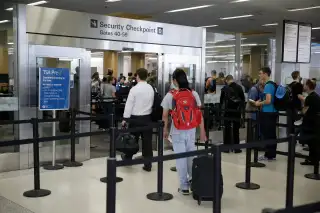The Best $100 You'll Ever Spend on Travel, According to One Frequent Flyer

A couple of years ago, I was flying back from a vacation in Central America with friends, and connecting through Miami airport.
I deplaned and split up with my friends as we went through Customs. Then I zipped back through security to grab a shuttle to a satellite terminal to try to stand by on an earlier flight. That failed, so I made my way back to my airline's main terminal and texted one friend to see if she wanted to find a restaurant.
“I just now got through security,” she replied. “I’ve got to go to my gate now. Sorry!”
I was stunned—it was a good two hours after our flight had touched down.
But it was also a validation.
About a year earlier, I had shelled out for Global Entry, the government screening program that's supposed to help frequent travelers speed past airport lines. As a result, I had sailed through Customs in Miami. Because Global Entry also comes with access to TSA PreCheck, which works for domestic travel checkpoints, I had also coasted back through security after clearing Customs, and had plenty of time for wild-goose chases of standby routes.
My friend, meanwhile, had spent those hours standing in one line after another. Ugh.
There's really no reason not to sign up for Global Entry if you're a regular traveler, and if you're likely to pass muster. Just be aware that the application fee is just that: It's not refunded if you fail the process. The Global Entry website notes that applicants may be rejected for offenses ranging from giving "false or incomplete information" to criminal convictions. Or, more ominously, for being the subject of a federal or other law enforcement investigation.
If your application is clean, however, you'll pay $100 for five years of Global Entry—just $20 per year. I like to think of it this way: If you make $50,000 a year, your time is worth roughly $25 an hour. So if you save an hour and a quarter per year, boom: The service just paid for itself. (It actually saves me a lot more time than that, but then again I fly almost once a month. Most people don't.)
What if you almost never fly international? In that case, you can probably get away with skipping Global Entry; just apply for TSA PreCheck directly. That will get you through preflight security faster, and it's slightly cheaper ($85 for five years instead of $100). It may also be less hassle: While both programs require an in-person interview, there are more application sites for TSA PreCheck than for Global Entry. (Frequent travelers to Canada and Mexico also have separate options—Nexus for the former, and Sentri for the latter's land crossings.)
Either way, this is money well spent. The research has already come down pretty clearly to show that people are happier when they spend their money on experiences, like travel, rather than on stuff. But if you travel a lot, you also probably know that spending time on lines at the airport is a very effective mood-killer.
For $20 a year, I've made pretty much the best happiness investment around.